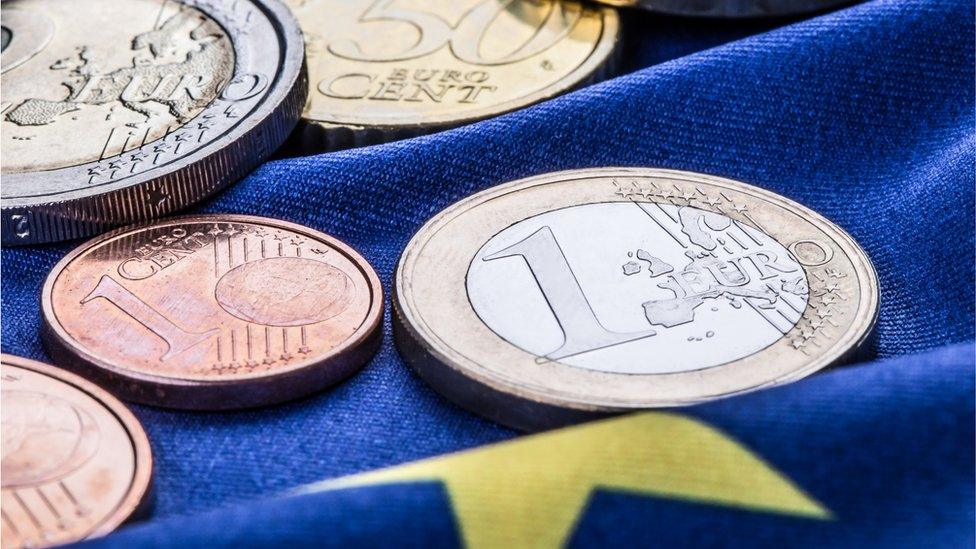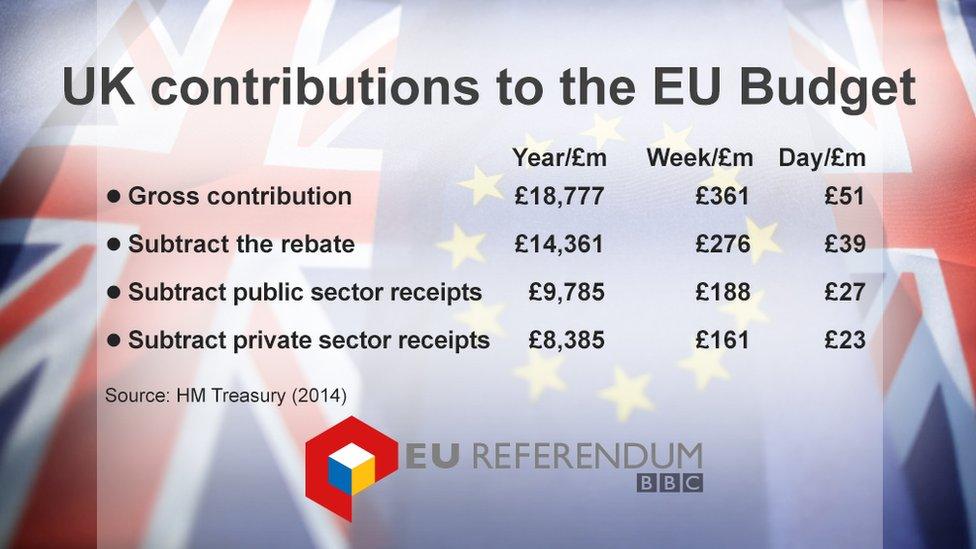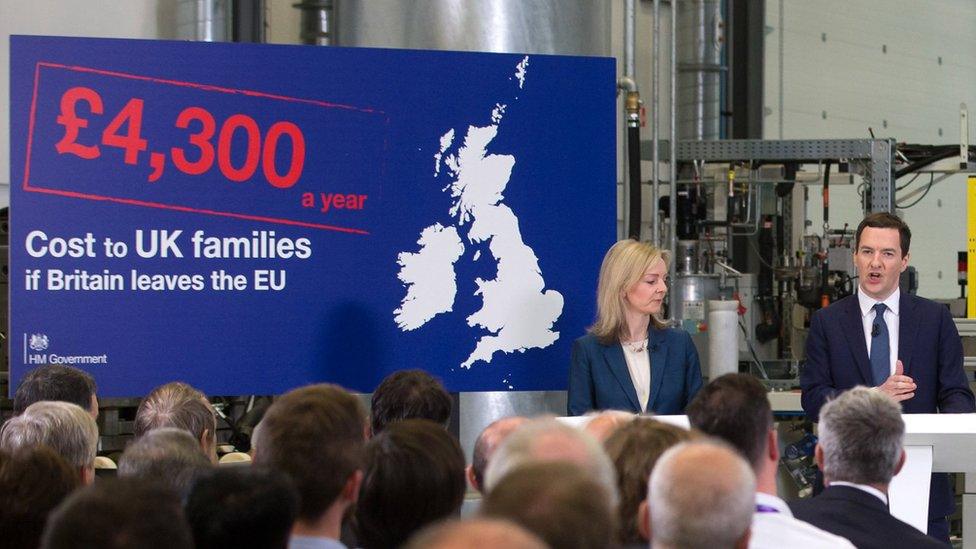Reality Check: Your questions on cost of EU membership
- Published

Lots of you have got in touch with Reality Check about the cost of EU membership. We've answered some of your questions below.
The question: Pete asks BBC's Radio 4 PM programme "Please could you explain why, even allowing for Margaret Thatcher's rebate, we still contribute more to the EU than France?"
The answer: We don't. In 2014 Germany paid in €29.1bn (£22.69bn), France was second with €21bn (£16.38bn) and the UK had the third highest contribution, paying in €14.1bn (£11bn). They're the most recent figures available.
If you take into account what each country gets back from the EU and the UK's rebate, then you get the same top three.
Germany's net contribution in 2014 was €17.7bn (£13.8bn), France was next with €7.4bn (£5.77bn) and the UK was just behind with €7.1bn (£5.54bn).
Each EU member state pays in a percentage of its gross national income and a percentage of the VAT it collects to the EU budget.
Margaret Thatcher's rebate means the UK gets back 66% of the difference between what it pays in and what it gets back. In 2014 this amounted to almost €5bn (£3.9bn).

This table is a guide to numbers you may hear quoted. The figure in the second line, for example, is not the value of the rebate, it's how much is left after you subtract it.
The question: Simon asks BBC Radio 4's PM programme "I notice from my tax summary this year that my personal contribution to the EU was £54 last year. Does this go towards the so-called £350m per week we send to the EU so often quoted by Brexit? Is there another pot we contribute from? If you earn less do you pay less? £54 does not sound a huge amount to me, £1 per week."
The answer: The first thing to be aware of is the £350m a week figure includes the rebate, money we never actually send to the EU. Of the remaining £276m a week which we send to the EU, we receive a certain percentage back in subsidies and to fund regional projects. When you take into account everything we receive, our contribution to the EU is £161m a week.
When you get your personal tax summary, it sets out how what you paid in income tax and national insurance contributions was spent. The Treasury works out the proportions of government expenditure - that is, what percentage was spent on welfare, on health, on state pensions and so on - and divides your tax bill according to those proportions. So the breakdown of spending you see on your annual tax summary is an illustrative allocation of how your individual tax payments were spent based on the proportions of overall public expenditure in different areas.
For example around 25% of our overall public spending is on welfare and accordingly, your tax summary will say that 25% of your personal tax contribution is allotted to welfare.
0.6% of our public spending goes to the EU so your tax summary will give a figure representing your personal contribution to the EU - that is 0.6% of your total tax bill. Everyone's tax summary will show the same percentages but the actual figure will of course depend on how much you earn and how much tax you pay - if you earn more, the figure will be higher. So, for example, if you have an annual salary of £26,000 and you pay £5,365 in tax, 0.6% of this or £32 will go to the EU budget.

The question: Anthony asks BBC Radio 4's PM programme "Will Germany or France pay the shortfall if the UK exits Europe?"
The answer: Once you deduct the UK rebate, as well as any money we receive back in agricultural subsidies, funding for regional projects and scientific research, the total UK net contribution to the EU budget is £161 million a week. The EU would be able to save some costs with fewer MEPs, Council and Commission staff in time, but the EU would still face a choice between making up the difference, probably by increasing contributions by other member states, or cutting EU spending.
If the EU decides to replace every penny of the UK's contribution lost through Brexit, it is likely the cost would be spread in the same way the contribution of each member state is decided now - in proportion to the size of its economy. In the scheme of things, the loss of the UK's annual net contributions would most likely pale in comparison with other consequences of Brexit, on economy and trade.

The question: Frank asks BBC Radio 4's PM programme "How much does an EU Ambassador receive in salary and expenses and is it true that their pension is the same as their salary for life?"
The answer: EU Ambassadors - the heads of EU delegations of the European External Action Service - fall under various remuneration grades depending on seniority (from AD9 to AD16 with most in between), and their salaries are calculated accordingly. The basic monthly salary of an AD9 Grade starts from €7,357.45 (£5,821.79) and the top basic monthly salary for an AD16 is € 18,962.24 (£15,004.41).
The basic salary of EU Commissioners is calculated as 112.5% of the top salary grade of an EU official which is currently just below €19,000 (£14,818) per month. This means that the basic monthly gross salary of an EU Commissioner is around €21,300 (£16,611). The salaries of the President and Vice-Presidents of the Commission are slightly higher at 138% and 125% of the top EU salary grade respectively. Note however, that these amounts are before taxes. The 28 members of the Commission pay 45% income tax on most of their salary as well as a solidarity levy of 7%, among other contributions.
In addition to their basic salaries, EU officials may be eligible for an expatriation allowance, education allowance and child allowance, among others.
The Commission's website states that "pensions of EU officials are paid as a percentage of the final basic salary. Officials accumulate 1.8% pension rights every year and are entitled to a maximum pension of 70% of their final basic salary." However, the Commission's press office told the BBC that in order to achieve this maximum, an EU official would need to work in the Commission for 39 years. In any case, it is inaccurate to suggest that the pensions of EU officials are the same as their salaries.
We've already answered your other questions on staff salaries, EU accounts, the funding spent on the poorest member states and the cost of the referendum. And you can find our Reality Check on where EU money actually goes here.
Keep your questions coming by email (realitycheck@bbc.co.uk) or via Twitter @BBCRealityCheck, external and we'll answer as many as we can before 23 June.



- Published19 May 2016

- Published5 April 2016

- Published18 April 2016

- Published22 February 2016
